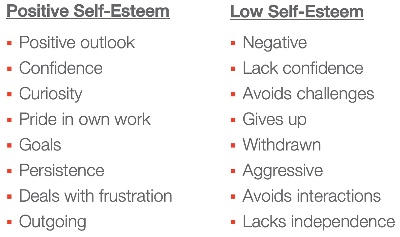Question
What is the impact of self-esteem?
Answer
We know that self-esteem is important for children, but here are some of the reasons why it's so important.

Figure 1. Impact of self-esteem, both positive and low.
If children develop positive self-esteem, they usually have a better outlook on life and specific situations. They tend not to be negative, like somebody who has low self-esteem would be. I know that we've all worked with people who have a more positive outlook. They're easier to work with. Sometimes when you're around them, you feel better about yourself. That's what we want for kids. We want them to have that positive outlook. We don't want them to always think about the worst-case scenario, because that tends to drag everyone down. If a child always feels like something is not working for them, sometimes they create problems and things don't work well for them.
Children with positive self-esteem are more confident to try new things. We want kids to be confident to try new experiences and new friend groups because that's going to serve them well in life. A four-year-old child who's been allowed to pick their outfit and go to the grocery store with their parents wearing mismatch shoes, a cape, a tiara, and maybe some crazy leggings, is usually pretty confident about it. As an adult, we would feel really self-conscious about that, but a four-year-old usually feels really good about those choices. We need to help kids build that confidence and help them feel good about the choices that they're making. Sometimes it's hard to go to the grocery store with a child that's dressed like that because you're going to get a lot of attention, but hopefully, you'll get some glances of, "Yeah, I'm glad you're letting your child do that because your child's confident in what they have on."
Positive self-esteem tends to help children be curious. Curiosity is a great characteristic to have and will help them with future learning. We want kids to take pride in their own work. I've seen children that have painted at an easel and painted so much that the paper just starts deteriorating. Those of you that have been around children painting at an easel know that they will layer it on and layer it on and are so proud of what they've created. Sometimes that paper will rip and they will work that rip into the scheme of their artwork because they're proud of what they've done. Some children with lower self-esteem may just give up. They may not continue trying because maybe they don't have the right support.
We want kids to be proud of what they do. We want them to be persistent and we want them to have goals. If you have positive self-esteem, you're more likely to set goals for yourself and more likely to reach those goals. Children with positive self-esteem tend to deal with frustrations better. Rather than becoming aggressive, giving up, or withdrawing, they tend to go with the flow. They may find another way to handle the situation. They may turn something that was a mistake into something that was really great.
Kids with positive self-esteem tend to be more outgoing so they're going to engage in more social interactions. They're more likely to have a group of supportive peers that would help them buffer stress. We want to promote children to have higher self-esteem because of all the great outcomes that will impact them positively throughout their life, social situations, and academic success. We want kids to put that self-esteem to good work.
If kids are coming to you and they already have some lower self-esteem characteristics, it's not all lost. It is possible for you to provide opportunities for kids to learn how to interact with others in a positive way and for them to become more confident. This can be done simply through the opportunities that you provide for them to build self-esteem. There's not a magic age that if you don't have it by this age, it's impossible to get. We want kids to develop it at whatever age they're ready to develop it and when they're in the company of positive adults who are there to help them. Be aware of when you see a child that looks like they are socially put together and has higher self-esteem and pair them up with a child that may not have as high self-esteem. This provides a peer modeling opportunity. We want kids to be successful and we have to watch for it, and we have to give them those opportunities to be successful.
This Ask the Expert is an edited excerpt from the course, Helping Young Children Develop a Positive Sense of Self, presented by Amber Tankersley, PhD.
